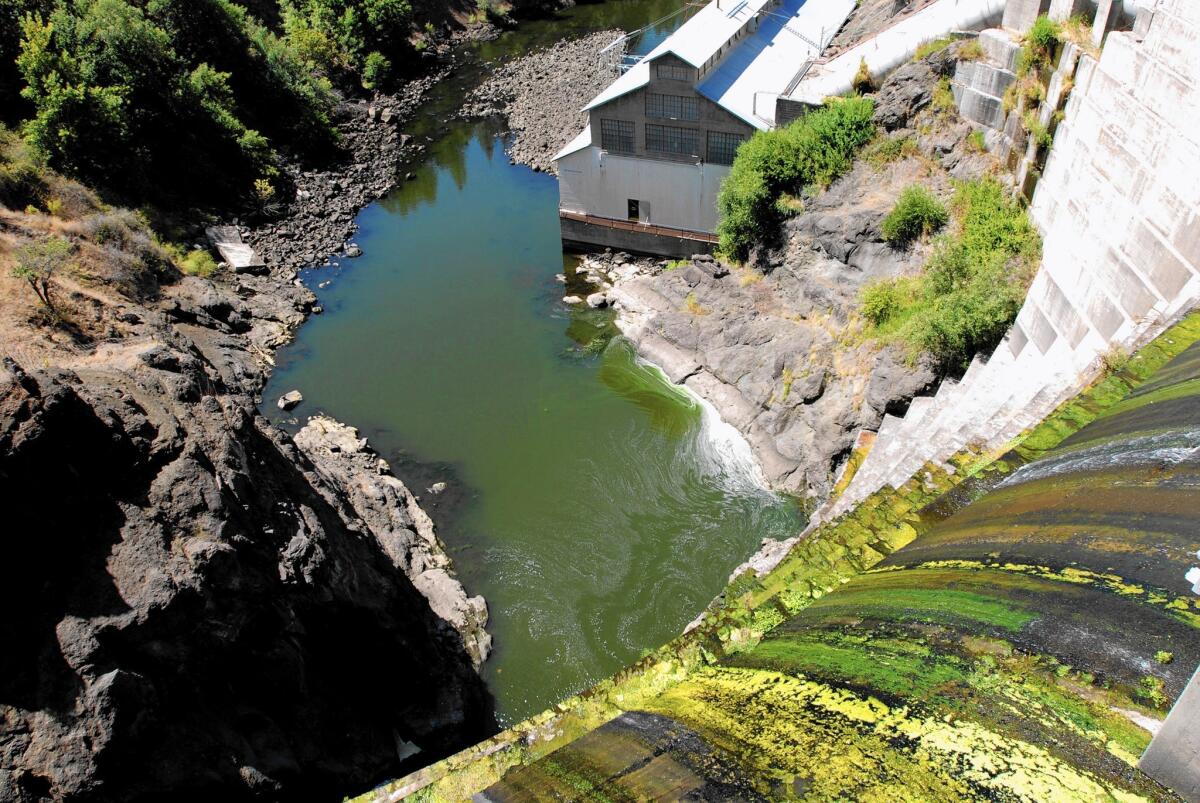A deal to remove four Klamath River dams is in danger of collapse

- Share via
Five years after a high-profile deal was struck to remove four hydroelectric dams and improve conditions on one of the West Coast’s prime salmon rivers, the agreement is on the verge of collapse for lack of action by Congress.
A crucial part of the Klamath River pact expires Dec. 31 unless Congress approves it, which appears less likely with each passing day because of Republican opposition.
The 2010 deal — backed by the dams’ owner, PacifiCorp, along with the states of California and Oregon and the federal government — was hailed as the path to peace on a river that has long been marked by strife between tribal, agricultural and fishery interests.
But its death wouldn’t stop campaigns to decommission the dams that block historical salmon rearing and spawning grounds on the river’s upper reaches.
“It’s not the end,” said Rep. Jared Huffman (D-San Rafael), whose congressional district includes the lower Klamath. “If anything it may be the beginning of a new and potentially more productive push to get these dams out by way of the [dam relicensing] process and the Clean Water Act authority the state of California has.”
The Klamath agreements have been controversial since their inception. Siskiyou County, in which three of the dams are located, and GOP congressmen have opposed dismantling private utility company dams that are a source of electricity and local property taxes.
California’s Hoopa Tribe was part of the initial talks but refused to support the accord on the grounds that it didn’t guarantee sufficient flows for struggling coho and Chinook salmon populations. And environmentalists complained that it allowed continued farming in wildlife refuges.
Originally set to expire in 2012 without congressional approval, the pact was extended to give Congress more time to act. Last year Oregon Sens. Ron Wyden and Jeff Merkley and California Sens. Dianne Feinstein and Barbara Boxer — all Democrats — introduced authorizing legislation.
But when Republican Rep. Greg Walden of Oregon, whose district includes the upper Klamath, released a draft House bill this month, it reflected the deep ideological chasm that has thwarted congressional action.
Although the draft included some provisions of the agreements, it omitted dam removal and added a clause that Democrats called a poison pill: giving 100,000 acres of timber land in the Fremont-Winema National Forest to Klamath County, Oregon, and another 100,000 acres of the Klamath National Forest to California’s Siskiyou County.
Merkley and Wyden immediately dismissed the land giveaway as a “known non-starter” in the Senate. And Huffman called the proposal an attempt to rewrite the core of the deal.
“This might be one way to appease some extreme right-wing stakeholders and Republican House members,” Huffman said. “But it would do so at the expense of me and lots of other Democrats who would be needed to pass it.”
Walden spokesman Andrew Malcolm said the land transfers would boost rural economies and help win crucial support in the House Natural Resources Committee. In a statement released Wednesday, the committee chairman, Republican Rep. Rob Bishop of Utah, said the transfers “are ideas I could strongly support in order to move forward.”
Dam opponents say if the Klamath pact dissolves, they will pursue dam removal through the Federal Energy Regulatory Commission’s relicensing process, which has been on hold.
“I do think it’s falling apart,” said attorney Tom Schlosser, who represents the Hoopa Tribe. “We’re going full-bore to get FERC to do its job.”
The four dams, the oldest of which dates to 1918, are spread across 65 miles of the Klamath, which winds from southern Oregon through the Cascades and Coast Range to California’s Pacific Coast. In addition to blocking migrating salmon, the hydro dams create stagnant pools of warm water in the summer that breed toxic algae, harming water quality.
PacifiCorp spokesman Bob Gravely said meeting the relicensing requirements of installing fish ladders and complying with water quality standards would cost the company some $400 million. The Klamath agreements limit company costs to half that amount, which PacifiCorp would recoup from ratepayers. California committed up to $250 million in state bond funding to cover the balance of the decommission costs.
“That makes the agreement a better outcome for our customers than what we were facing under relicensing,” Gravely said.
Even without the deal, many Klamath watchers argue that it will ultimately be more economical for PacifiCorp — part of Warren Buffett’s Berkshire Hathaway Inc. empire — to dismantle the dams than retrofit them.
The agreements don’t solely deal with the dams. They spell out water allocations for irrigators and wildlife refuges and establish fish restoration and monitoring programs.
A third settlement was added last year to soften the effect of a 2013 legal ruling that granted Oregon’s Klamath Tribes the oldest water rights in the Upper Klamath Basin, putting the tribes in a position to curtail diversions by ranchers and farmers with junior rights.
Congressional approval would also trigger federal spending to execute the water management, monitoring and restoration portions of the agreements, expected to cost $750 million over a 15-year period.
“We need Congress to act,” said Greg Addington, executive director of the Klamath Water Users Assn., which includes 15 irrigation districts in Oregon and California. “I don’t think we’re going to put this back together again next year.”
Twitter: @boxall
MORE SCIENCE NEWS
In vitro fertilization goes to the dogs
Sad news: Scientists say happiness won’t extend your life after all
CDC grades American schools on how well they teach sex education







